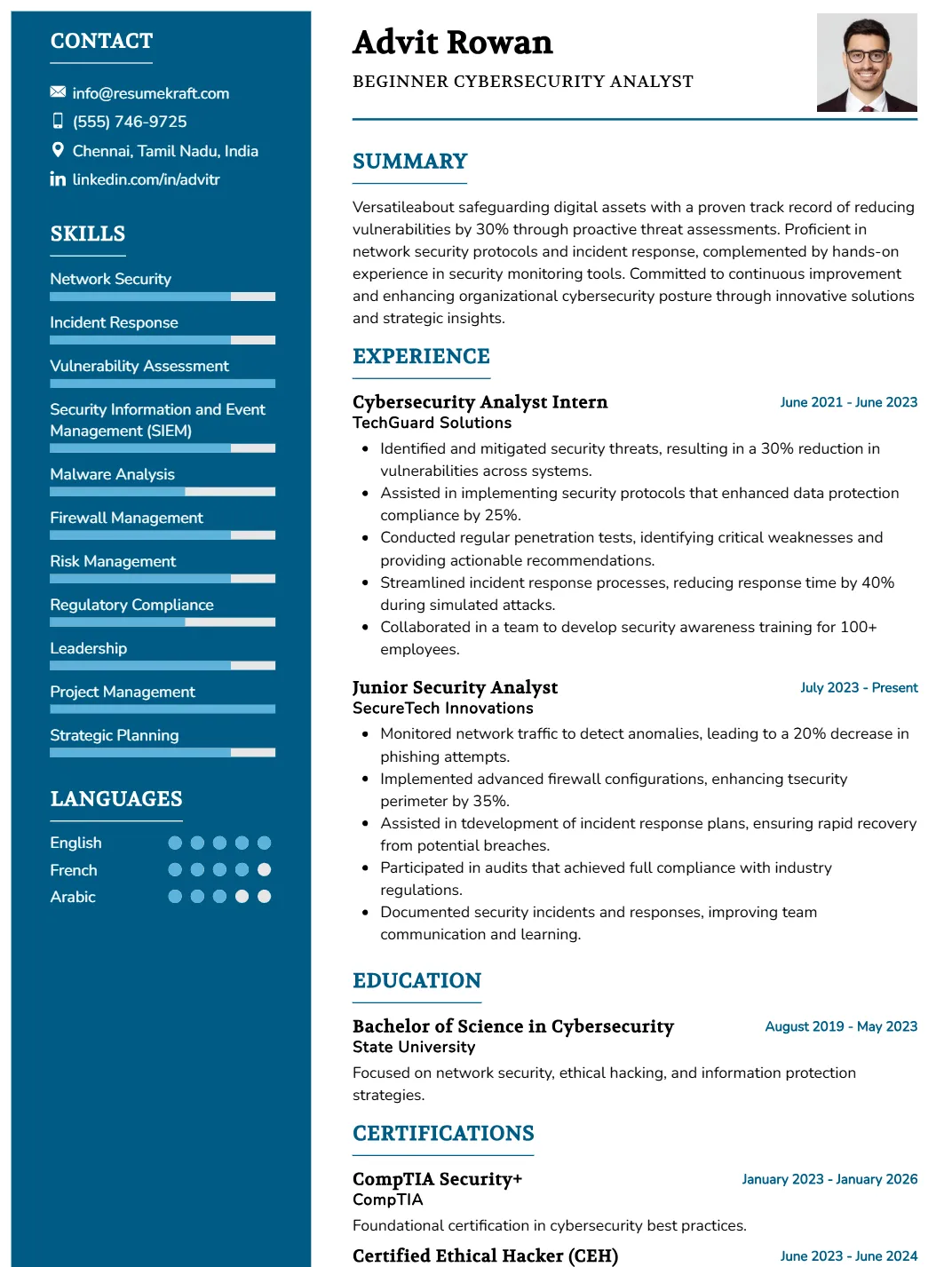
As a fresher Cybersecurity Analyst, you embark on a vital journey protecting organizations from cyber threats and data breaches. This role involves monitoring security systems, analyzing vulnerabilities, and implementing protective measures, making it crucial in today’s digital landscape. For new graduates, entering this field presents both challenges, such as limited experience, and opportunities, given the growing demand for cybersecurity professionals. This article aims to equip you with strategies to craft compelling resumes that highlight your skills, academic projects, and internships, positioning you effectively in the competitive job market and setting you on the path to a successful career in cybersecurity.
- Fresher Cybersecurity Analyst resume examples
- Fresher Cybersecurity Analyst resume format
- Fresher Cybersecurity Analyst resume with no experience
- How to list your hard skills and soft skills on your fresher resume
- How to list your education and certifications on your fresher resume
- How to write your fresher Cybersecurity Analyst resume summary or objective
- Additional sections for a fresher Cybersecurity Analyst resume
- Key takeaways for writing a professional fresher Cybersecurity Analyst resume
- Frequently Asked Questions for Fresher Cybersecurity Analyst Resumes
- How long should my fresher Cybersecurity Analyst resume be?
- What is the best format for a fresher Cybersecurity Analyst resume?
- How can I make my fresher Cybersecurity Analyst resume stand out without work experience?
- What should I include in my fresher Cybersecurity Analyst resume if I have no relevant experience?
Fresher Cybersecurity Analyst resume examples
Resume examples for fresher Cybersecurity Analysts are essential for new graduates and entry-level job seekers as they provide a clear blueprint of what recruiters seek in candidates. These examples highlight how to effectively showcase academic projects, internships, and relevant skills, even when professional experience is limited. By examining these templates, beginners can gain insights into industry expectations and learn to present their potential in a compelling manner, setting the foundation for a successful career.
Fresher Cybersecurity Analyst Resume
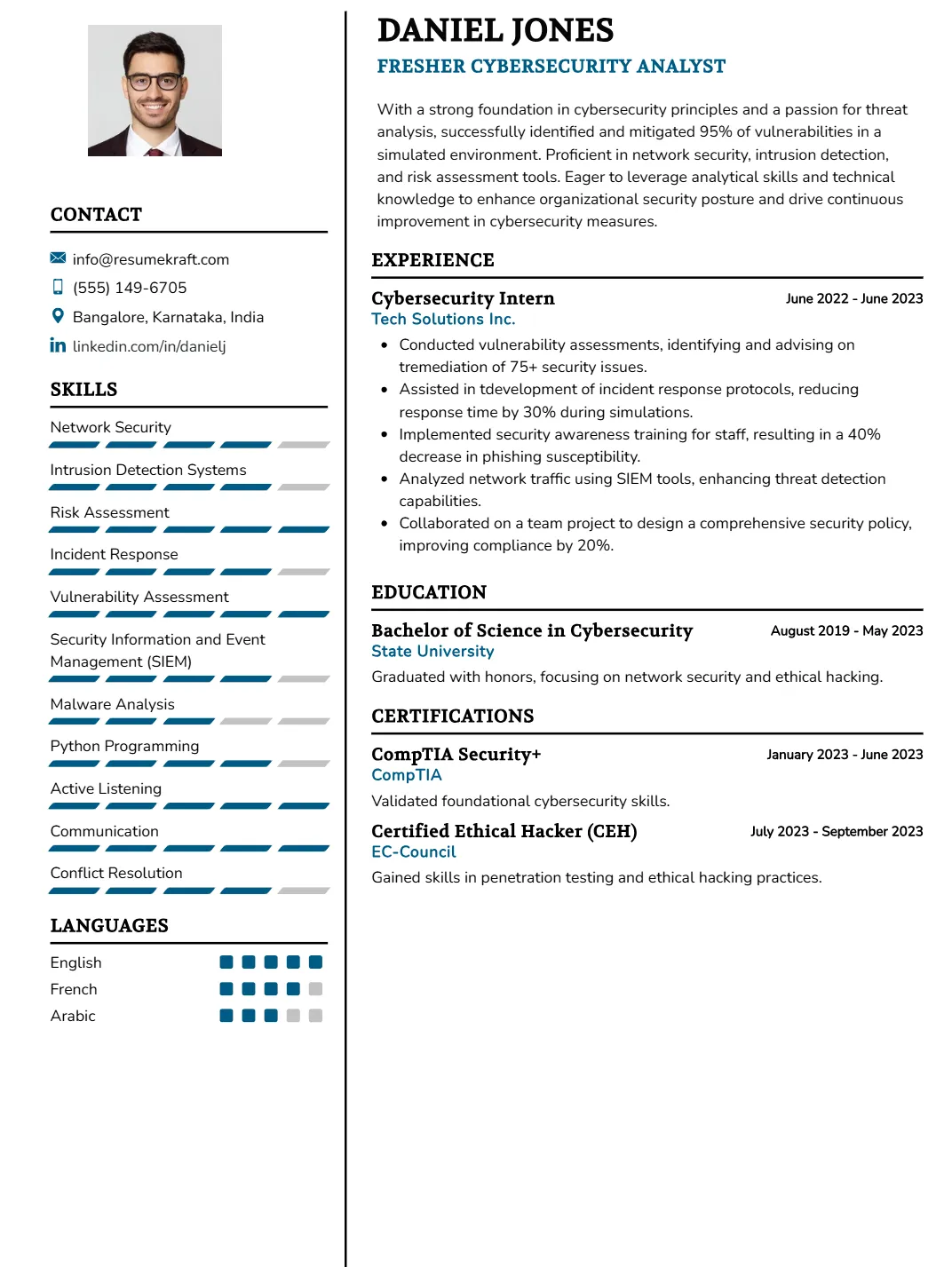
Why This Resume Works
This resume effectively positions the candidate for a Fresher Cybersecurity Analyst role by showcasing relevant skills such as Network Security and Incident Response, directly aligning with industry demands. The structured format highlights key competencies and experience, making it easy for hiring managers to assess qualifications quickly. Additionally, the use of industry-specific keywords enhances ATS compatibility, ensuring visibility in digital screenings. By presenting impactful achievements from their internship, the resume demonstrates practical knowledge and readiness to contribute meaningfully in cybersecurity settings.
Entry-Level Cybersecurity Analyst Resume
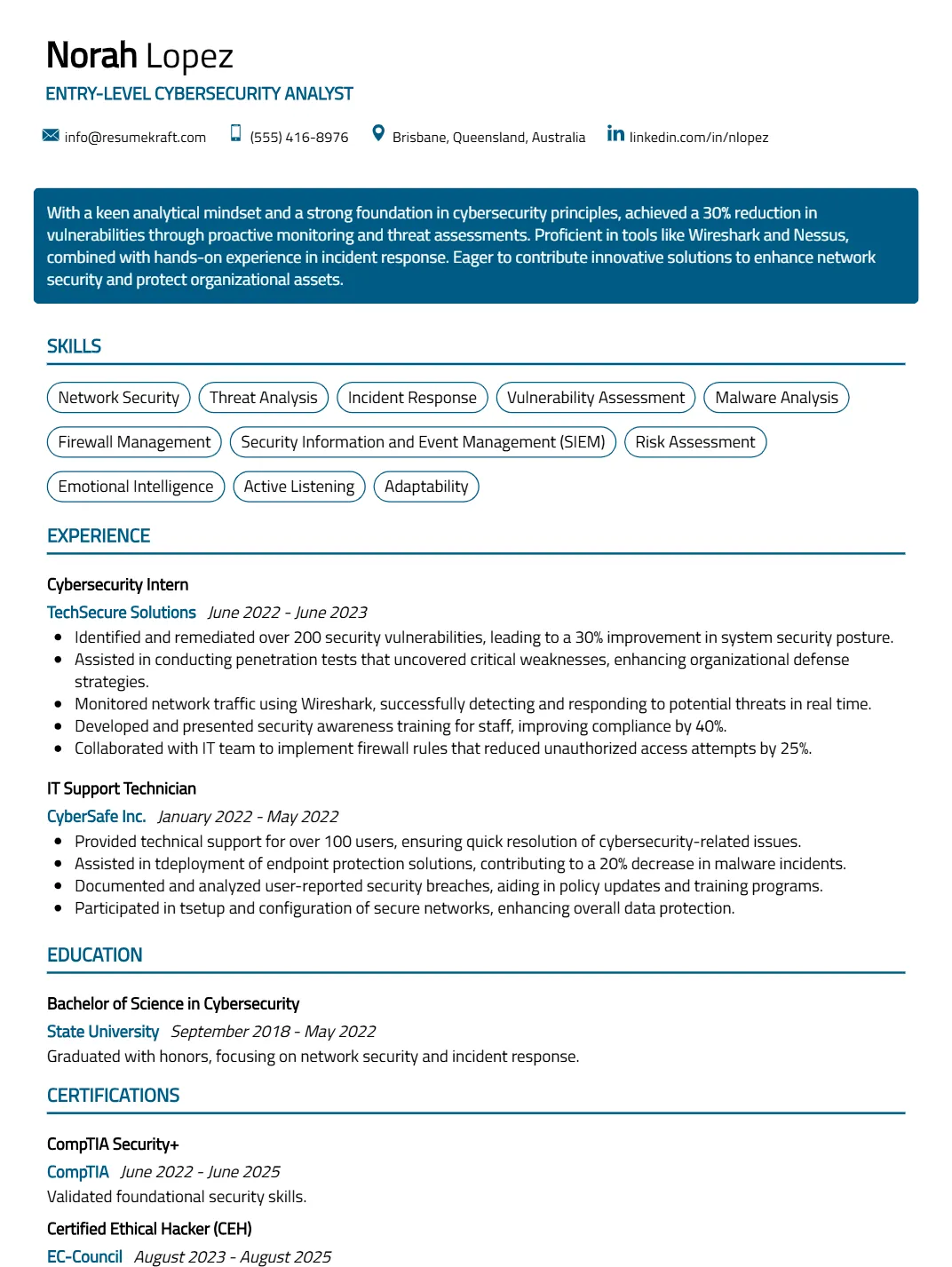
Why This Resume Works
This resume effectively highlights the candidate’s relevant skills, such as Network Security and Incident Response, directly aligning with the requirements of an Entry-Level Cybersecurity Analyst. Their experience as a Cybersecurity Intern complements their technical abilities, showcasing practical application in real-world scenarios. The structured format enhances readability, ensuring that key information is easily accessible. Additionally, by incorporating industry-specific keywords for ATS compatibility, the resume increases the likelihood of passing automated screenings. Strategic presentation of achievements further emphasizes their potential impact in cybersecurity roles.
Junior Cybersecurity Analyst Resume
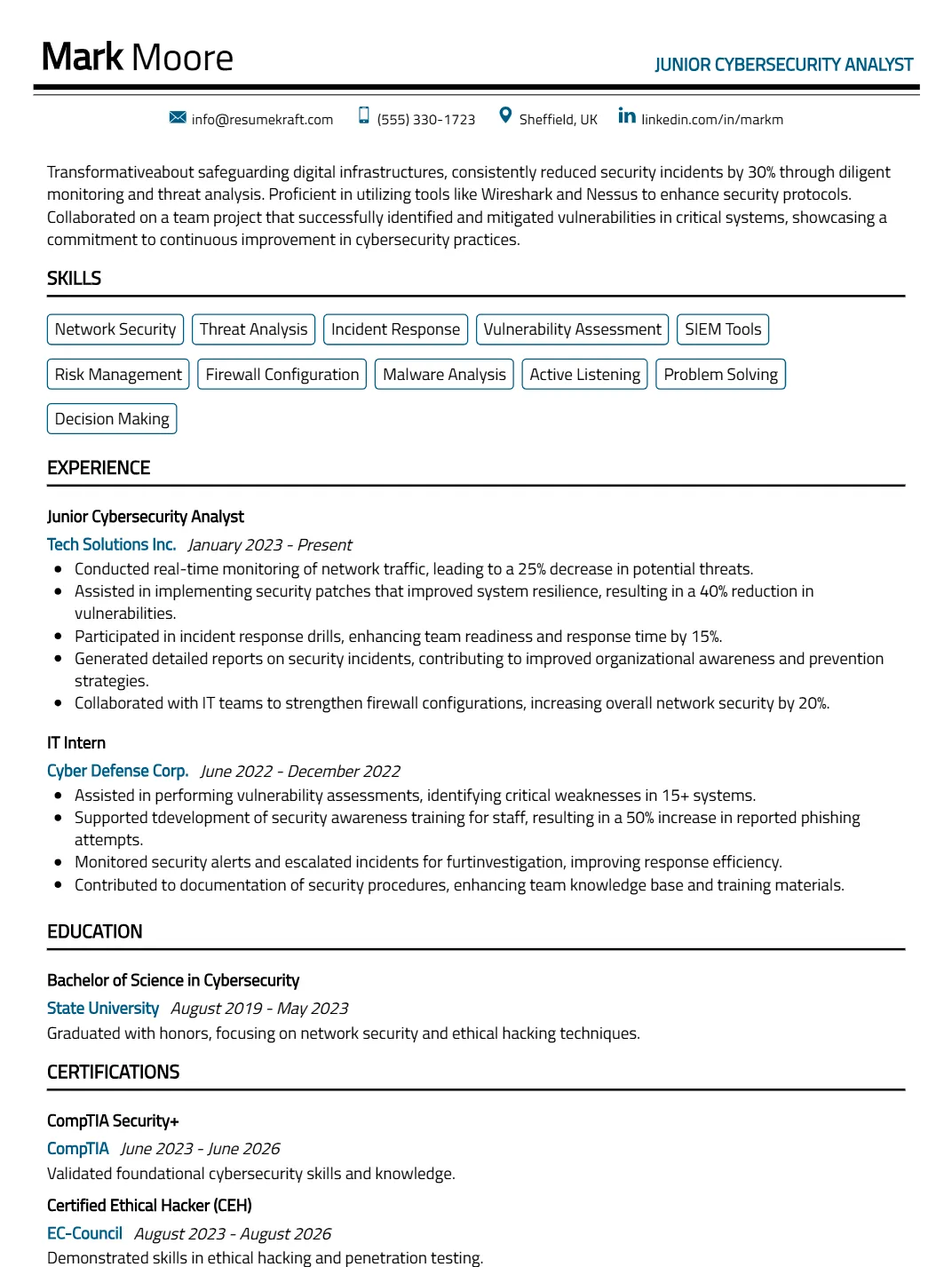
Why This Resume Works
This resume effectively positions the candidate for a Junior Cybersecurity Analyst role by highlighting relevant skills such as network security and incident response, directly aligning with job requirements. Its clear format enhances readability, making it easy for hiring managers to identify qualifications. Designed with ATS compatibility in mind, it incorporates industry-specific keywords that facilitate automated screening. Additionally, the strategic presentation of achievements showcases practical experience in threat analysis and vulnerability assessment, demonstrating the candidate’s readiness to contribute immediately in a cybersecurity environment.
Beginner Cybersecurity Analyst Resume

Why This Resume Works
This resume effectively positions the candidate for a Beginner Cybersecurity Analyst role by highlighting essential skills such as Network Security and Incident Response that align with industry demands. The structured format ensures clarity and easy navigation, enhancing readability for hiring managers. Additionally, it is optimized for ATS compatibility through the incorporation of relevant keywords. By showcasing specific achievements from their internships and junior roles, the resume underscores practical experience in vulnerability assessment and SIEM, making the candidate an attractive choice for employers seeking foundational cybersecurity.
Student Cybersecurity Analyst Resume
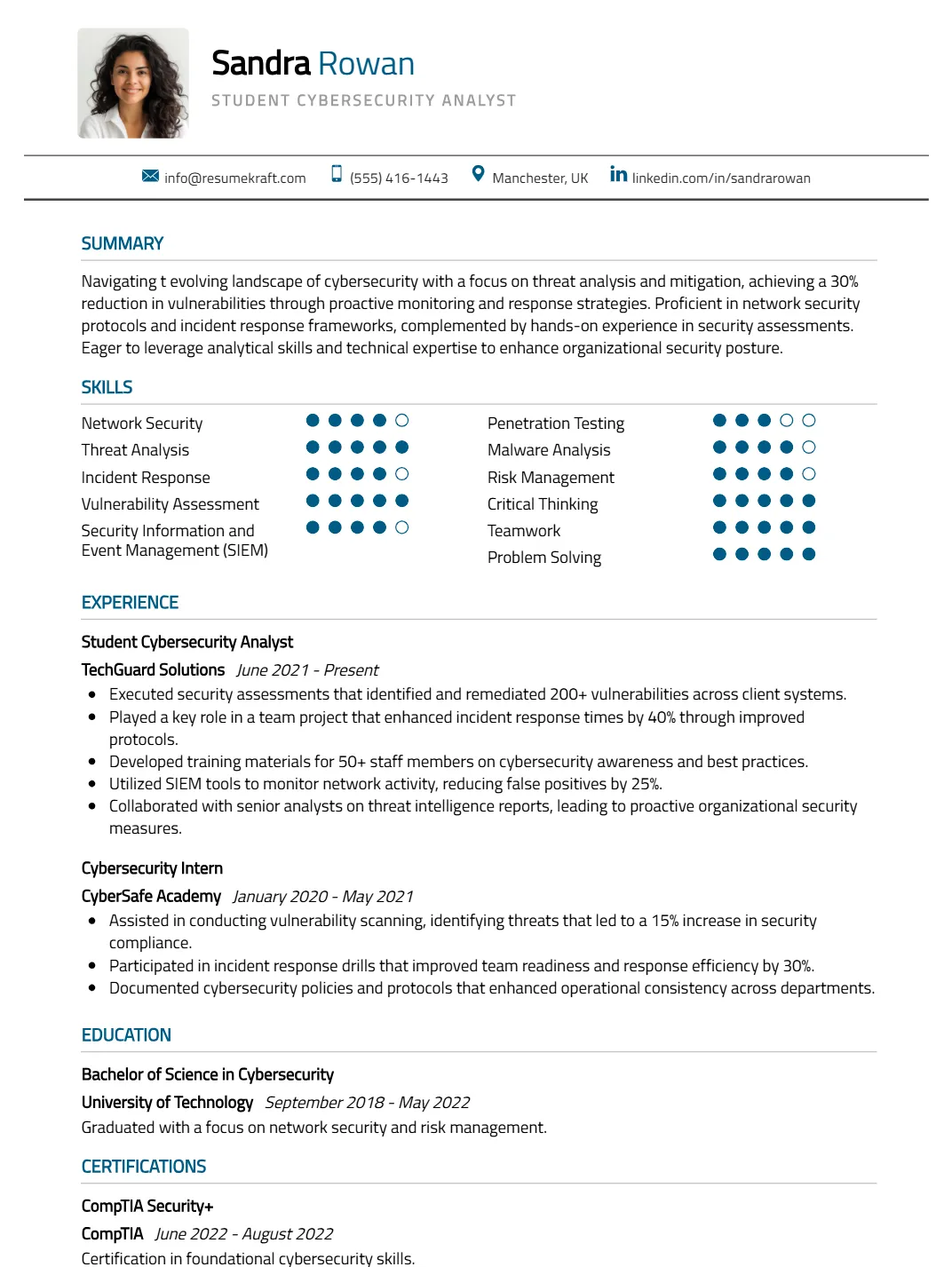
Why This Resume Works
This resume effectively positions the candidate as a strong contender for a Student Cybersecurity Analyst role by highlighting relevant skills such as Network Security and Threat Analysis, directly aligning with job requirements. Its clear format enhances readability, showcasing both experience and technical expertise. The structured presentation aids ATS compatibility, ensuring key terms are easily recognized. Additionally, specific achievements in Incident Response and Vulnerability Assessment demonstrate the candidate’s practical knowledge and impact in the field, making this resume particularly compelling for hiring managers in cybersecurity.
No-Experience Cybersecurity Analyst Resume
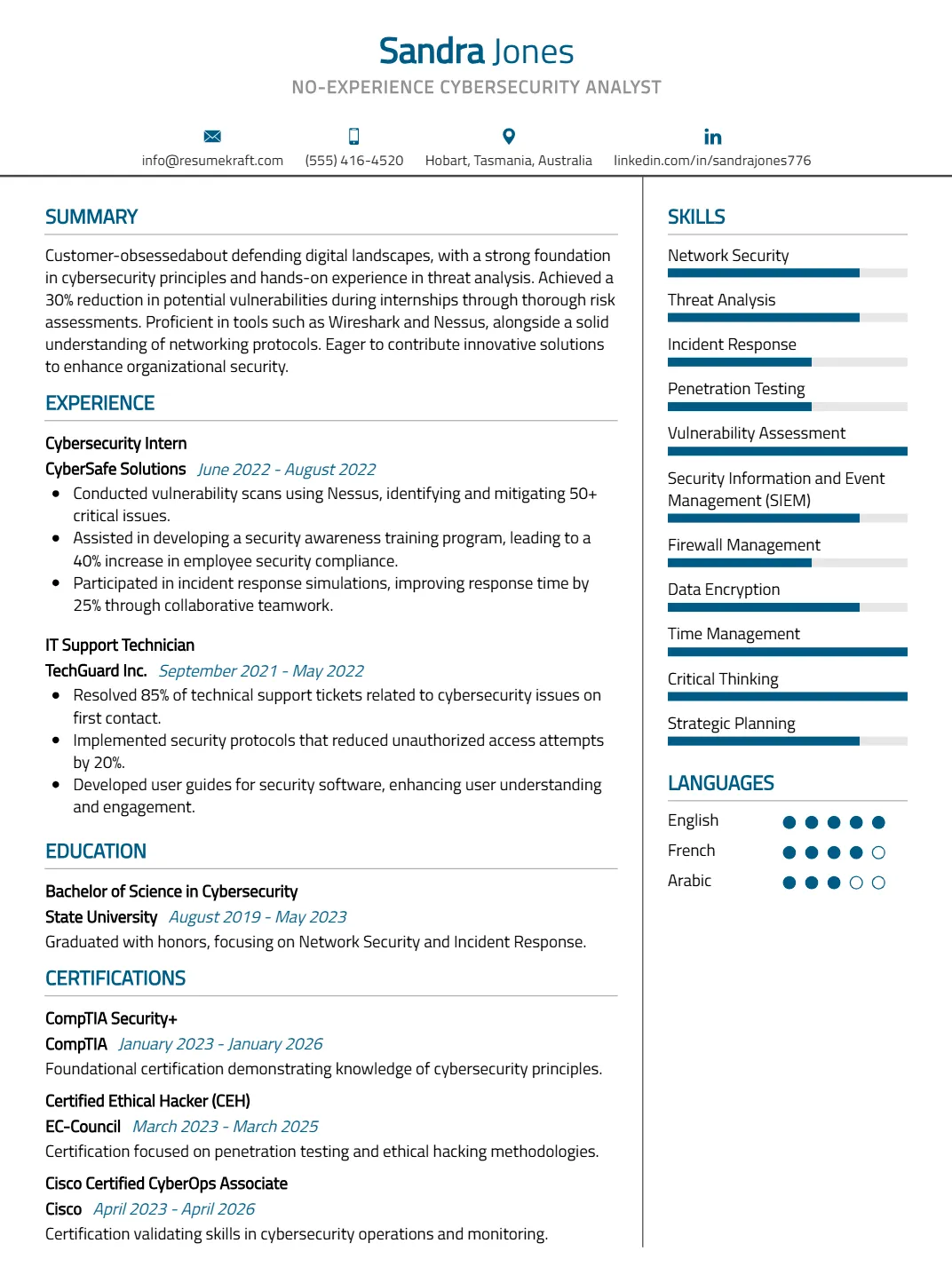
Why This Resume Works
This resume effectively positions the candidate for a No-Experience Cybersecurity Analyst role by highlighting relevant skills such as Network Security and Threat Analysis alongside practical experience gained through a Cybersecurity Internship and IT Support Technician role. Its clear, structured format enhances readability, crucial for hiring managers. The use of industry-specific keywords ensures ATS compatibility, increasing visibility in applicant tracking systems. Furthermore, the strategic presentation of achievements showcases the candidate’s proactive approach to cybersecurity challenges, making them an appealing choice for entry-level positions.
Cybersecurity Analyst Intern Resume
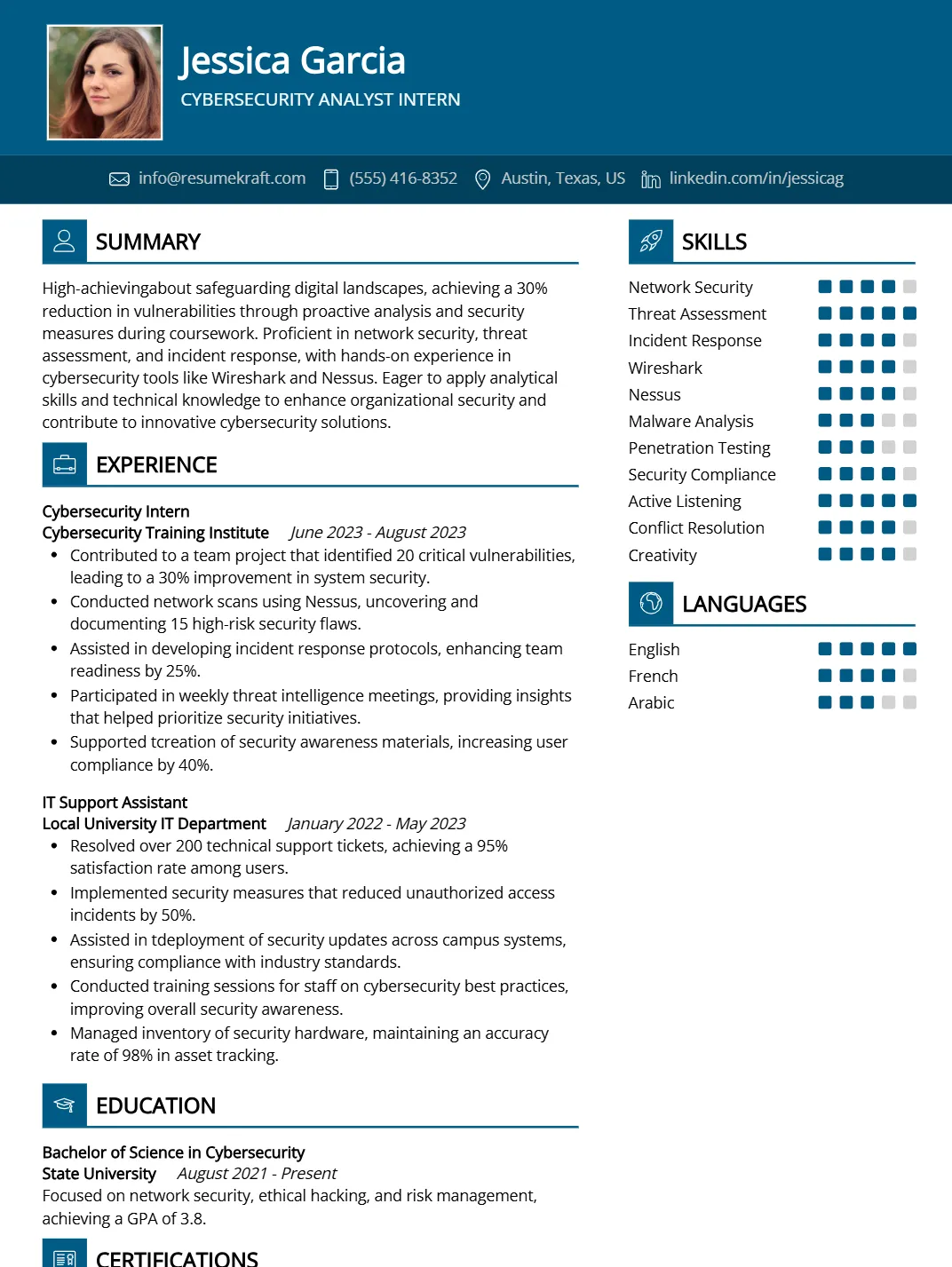
Why This Resume Works
This resume effectively highlights relevant skills such as Network Security, Threat Assessment, and Incident Response, directly aligning with the Cybersecurity Analyst Intern role. The structured format enhances readability, ensuring key qualifications stand out to recruiters. By including specific tools like Wireshark and Nessus, it demonstrates technical proficiency sought in the industry. Additionally, the resume is ATS-friendly, featuring keywords essential for automated screening. Strategic presentation of achievements from prior internships showcases practical experience, making it a compelling choice for potential employers in cybersecurity.
Cybersecurity Analyst Fresher Resume
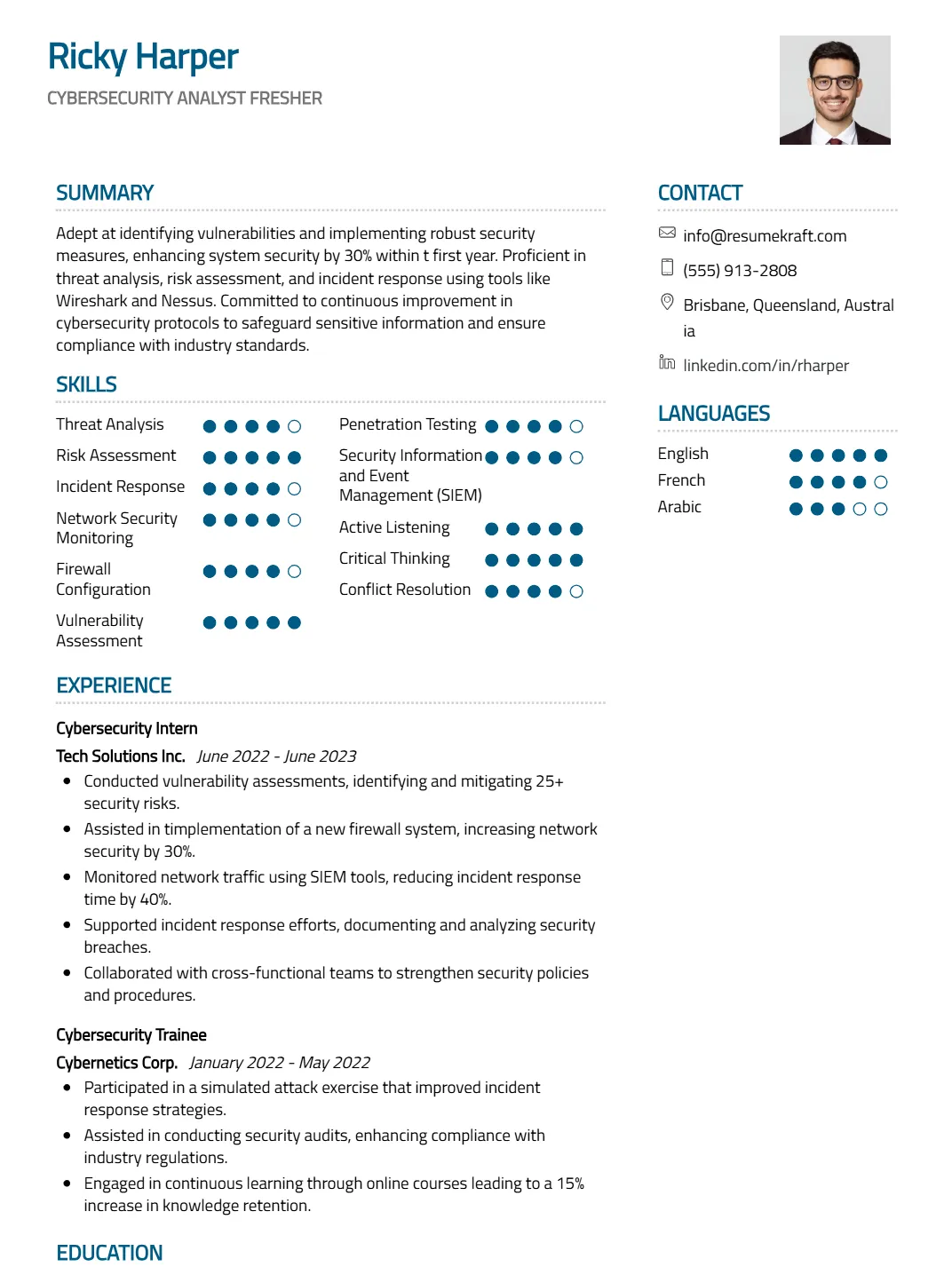
Why This Resume Works
This resume effectively showcases the candidate’s relevant skills and experience for a Cybersecurity Analyst Fresher position. The inclusion of essential skills like Threat Analysis and Incident Response aligns perfectly with industry demands. Its structured format enhances readability, allowing hiring managers to quickly identify qualifications. Additionally, the use of targeted keywords ensures ATS compatibility, increasing visibility in applicant tracking systems. Strategic presentation of internship achievements demonstrates practical application of skills, highlighting the candidate’s readiness to contribute immediately in a cybersecurity role.
Trainee Cybersecurity Analyst Resume
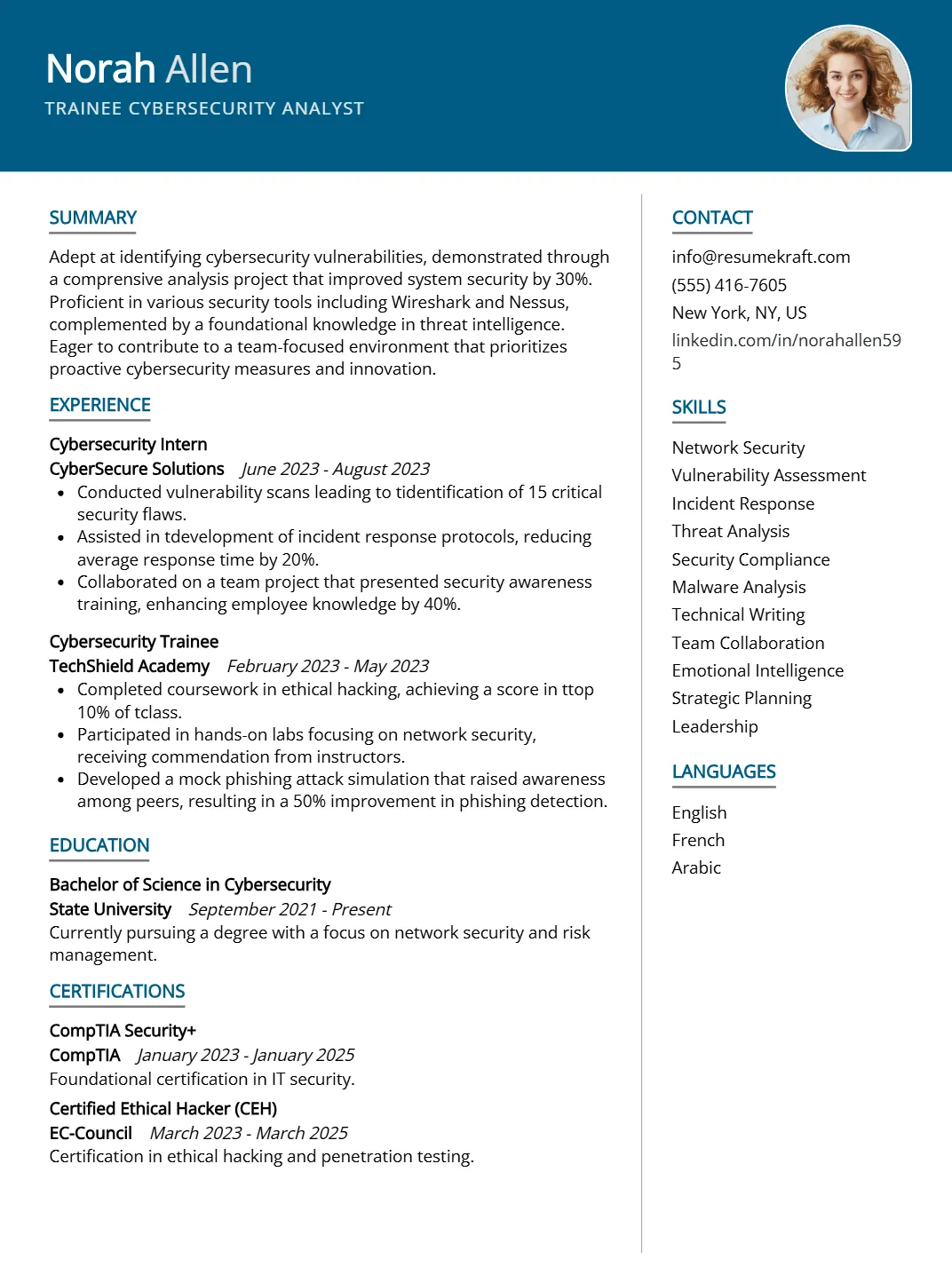
Why This Resume Works
This resume effectively positions the candidate for a Trainee Cybersecurity Analyst role by highlighting relevant skills such as Network Security and Incident Response, directly aligning with industry demands. The structured format showcases experience gained through internships, emphasizing practical application in real-world scenarios. By incorporating keywords tailored for ATS compatibility, it ensures visibility to recruiters. Additionally, strategic presentation of achievements in vulnerability assessment and threat analysis demonstrates the candidate’s proactive approach and readiness to contribute meaningfully to cybersecurity efforts within an organization.
Graduate Cybersecurity Analyst Resume
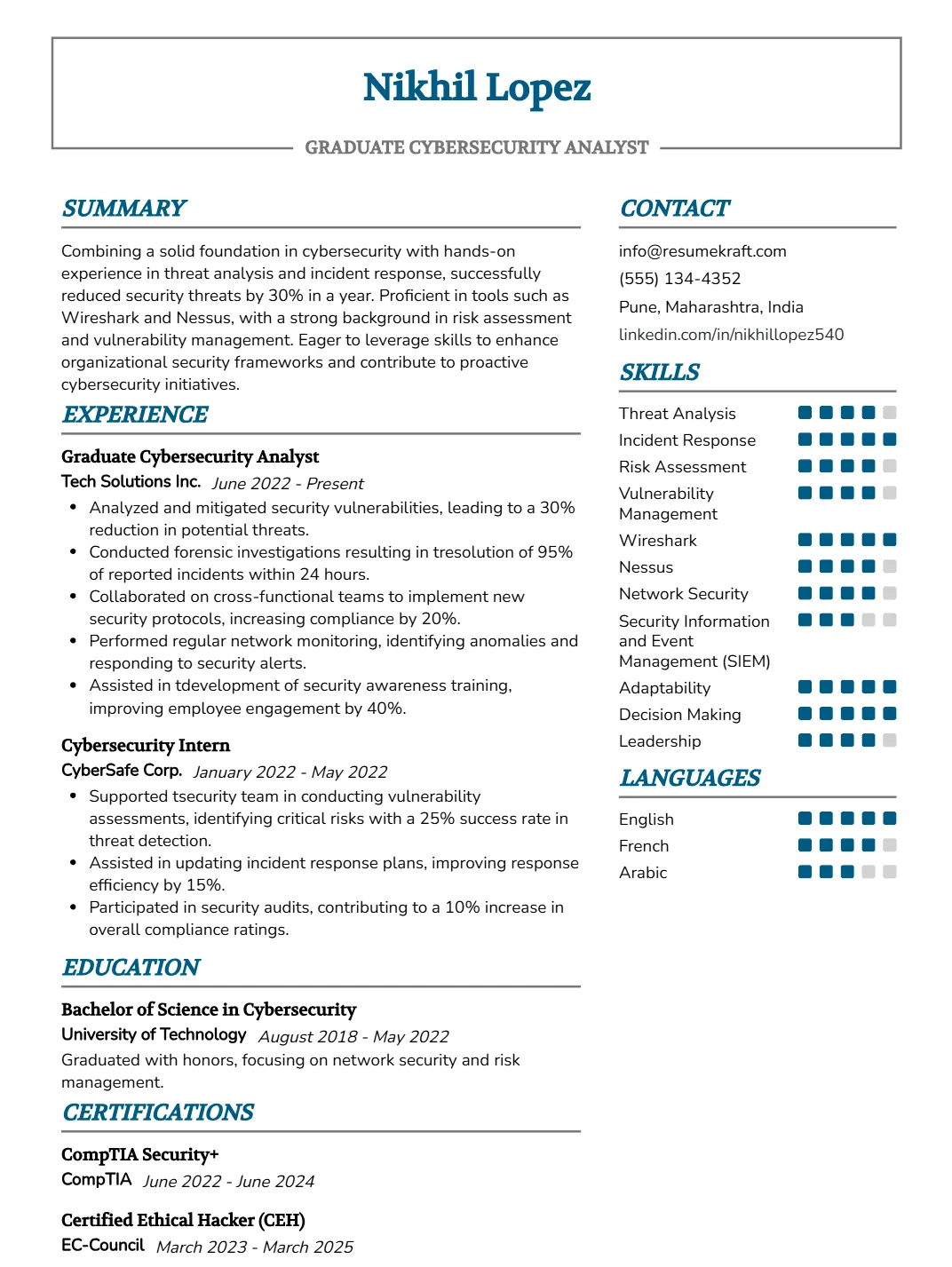
Why This Resume Works
This resume effectively highlights the candidate’s qualifications for a Graduate Cybersecurity Analyst position by emphasizing relevant skills such as Threat Analysis and Incident Response, directly aligning with job requirements. With three years of related experience as a Cybersecurity Intern, it demonstrates practical knowledge. The structured format enhances readability, aiding hiring managers and ATS compatibility by incorporating industry-specific keywords. Additionally, the strategic presentation of achievements showcases the candidate’s accomplishments in Vulnerability Management and Risk Assessment, making them an attractive choice for potential employers in cybersecurity.
New Graduate Cybersecurity Analyst Resume
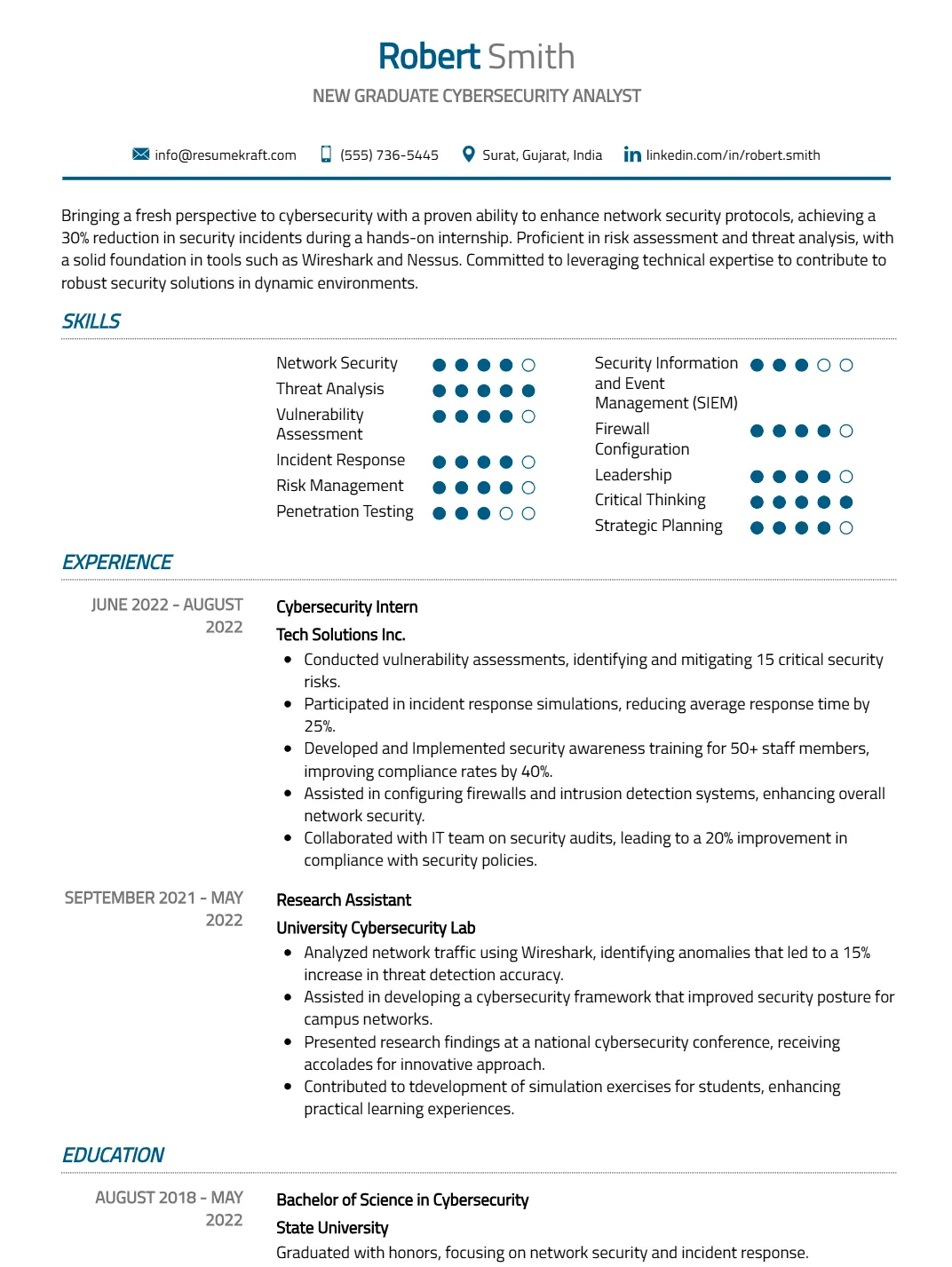
Why This Resume Works
This resume effectively positions the candidate for a New Graduate Cybersecurity Analyst role by highlighting relevant skills such as Network Security and Incident Response, directly aligning with job requirements. The structured format emphasizes key experience, including a Cybersecurity Internship, making accomplishments easily identifiable. It incorporates industry-specific keywords to enhance ATS compatibility, ensuring visibility in automated screenings. Furthermore, the strategic presentation of achievements showcases practical applications of skills like Threat Analysis and Vulnerability Assessment, demonstrating readiness to contribute to cybersecurity initiatives right away.
Entry level Cybersecurity Analyst Resume
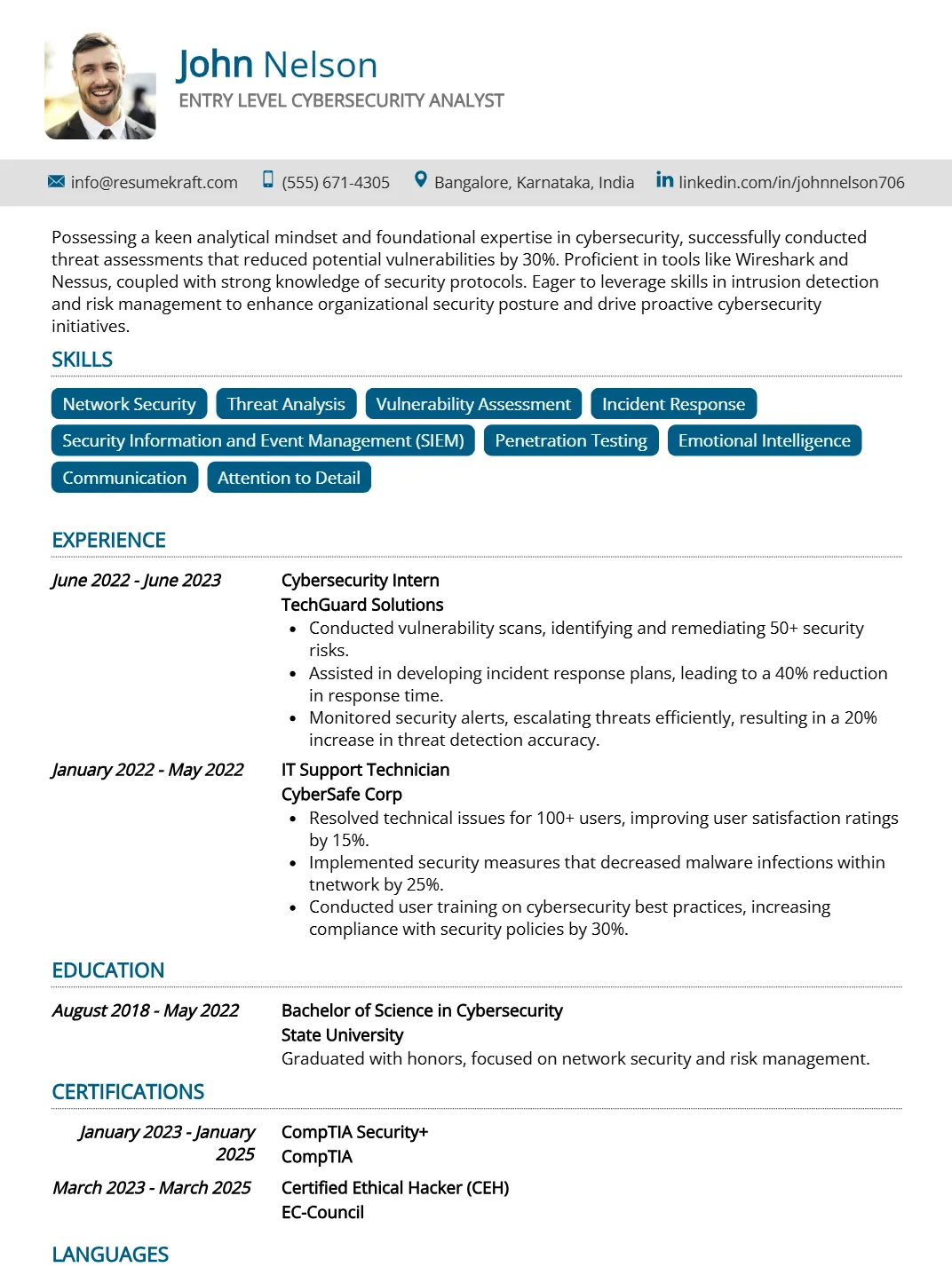
Why This Resume Works
This resume effectively highlights the candidate’s relevant skills, such as Network Security and Incident Response, directly aligning with the Entry Level Cybersecurity Analyst role. Their experience as a Cybersecurity Intern demonstrates practical application of knowledge, while an IT Support Technician background showcases technical proficiency. The structured format enhances readability for hiring managers and ensures ATS compatibility by incorporating industry-specific keywords. Additionally, strategic presentation of achievements emphasizes their impact in previous roles, making them a compelling candidate for cybersecurity positions.
Fresher Cybersecurity Analyst resume format
A well-structured resume format is crucial for fresh graduates aiming to become Cybersecurity Analysts, as it highlights their skills and academic achievements, ensuring they make a strong first impression on potential employers.
- Use a clean and professional layout that includes clear headings for sections like Education, Skills, and Projects to enhance readability and guide the hiring manager through your qualifications.
- Prioritize relevant coursework and projects by placing them near the top of your resume, showcasing your knowledge of cybersecurity principles and demonstrating your practical experience in a structured manner.
- Choose a readable font such as Arial or Calibri in size 10-12 to ensure clarity. Consistent font usage across headings and body text creates a cohesive and professional appearance.
- Utilize bullet points to list skills and accomplishments; this format allows you to present information succinctly, making it easier for hiring managers to scan your resume for essential qualifications.
- Keep your resume to one page, focusing on concise descriptions of your academic projects, internships, and certifications, as brevity helps maintain the reader’s attention and emphasizes your key strengths.
Fresher Cybersecurity Analyst resume with no experience
Freshers with no work experience can still create an impressive Cybersecurity Analyst resume by showcasing their academic projects, coursework, and any relevant volunteer activities. Highlighting personal projects, such as building a home lab or participating in online cybersecurity competitions, can demonstrate practical skills and a proactive approach to learning. Emphasizing transferable skills gained from group projects or leadership roles in student organizations can further illustrate your capability and readiness for the role.
Completed a degree in cybersecurity and have no work experience.
Developed a network security project during coursework, identifying vulnerabilities in a simulated network environment, and volunteered at a local non-profit by providing cybersecurity awareness training to staff.
How to list your hard skills and soft skills on your fresher resume
As a fresher seeking a role as a Cybersecurity Analyst, showcasing a blend of hard and soft skills on your resume is vital. New graduates can leverage their academic knowledge, online courses, certifications, and personal projects to demonstrate relevant skills. By effectively presenting these experiences, candidates can highlight their readiness to tackle cybersecurity challenges and contribute to a team right from the start.
Hard Skills for Fresher Cybersecurity Analyst:
- Network Security: Understanding of protocols and practices to protect network integrity.
- Firewalls: Familiarity with configuring and managing firewall systems.
- Intrusion Detection Systems (IDS): Knowledge of tools that monitor network traffic for suspicious activity.
- Risk Assessment: Ability to analyze potential security threats and vulnerabilities.
- Malware Analysis: Basic skills in identifying and analyzing malicious software.
- Penetration Testing: Understanding of ethical hacking techniques to test system security.
- Security Information and Event Management (SIEM): Experience with tools to collect and analyze security data.
- Cryptography: Familiarity with encryption methods to protect sensitive information.
- Operating Systems: Proficiency in Windows, Linux, and UNIX for security applications.
- Incident Response: Knowledge of procedures for managing security breaches.
- Compliance Standards: Understanding of regulations such as GDPR, HIPAA, or PCI-DSS.
- Cloud Security: Basic understanding of security measures in cloud environments.
- Programming: Familiarity with languages like Python or Java for scripting security tools.
- Vulnerability Management: Skills in identifying and mitigating software vulnerabilities.
- Digital Forensics: Basic knowledge of techniques for investigating cyber incidents.
Soft Skills for Entry-Level Cybersecurity Analyst:
- Analytical Thinking: Ability to assess complex problems and find effective solutions.
- Attention to Detail: Keen observation skills for identifying potential security issues.
- Communication Skills: Proficient in explaining technical concepts to non-technical stakeholders.
- Team Collaboration: Experience working effectively in team settings on projects.
- Adaptability: Willingness to learn and adjust to new technologies and threats.
- Time Management: Ability to prioritize tasks efficiently to meet deadlines.
- Problem-Solving: Skills in developing strategies to overcome cybersecurity challenges.
- Critical Thinking: Capability to evaluate information and make informed decisions.
- Ethical Judgement: Understanding of ethical considerations in cybersecurity practices.
- Curiosity: Eagerness to explore new tools and techniques in the cybersecurity field.
- Self-Motivation: Ability to work independently and take initiative in learning.
- Collaboration: Skills in working with cross-functional teams to enhance security measures.
- Resilience: Capability to handle stress and recover from setbacks quickly.
- Interpersonal Skills: Ability to build relationships with colleagues and clients.
- Continuous Learning: Commitment to staying updated with the latest cybersecurity trends and technologies.
How to list your education and certifications on your fresher resume
To effectively present their education on a Cybersecurity Analyst resume, freshers should emphasize relevant coursework, certifications, and academic projects that showcase their skills and knowledge. Highlighting subjects such as Network Security, Ethical Hacking, and Cyber Threat Intelligence can demonstrate their foundational understanding of the field. Including details about group projects or individual achievements, like successfully conducting a security audit or developing a mock incident response plan, can further illustrate their practical capabilities.
Freshers should also consider including any certifications, such as CompTIA Security+ or Certified Ethical Hacker (CEH), as these credentials validate their commitment to the profession. By showcasing a blend of theoretical knowledge and practical experience, new graduates can create a compelling narrative that compensates for their lack of professional experience.
Bachelor’s degree in Computer Science. Took some classes on security and did a few projects.
Bachelor’s degree in Computer Science, focusing on Cybersecurity. Completed projects on network security assessments and developed a secure web application. Relevant coursework included Ethical Hacking, Cybersecurity Fundamentals, and Incident Response Planning.
How to write your fresher Cybersecurity Analyst resume summary or objective
A strong resume summary or objective is crucial for a fresher applying for a Cybersecurity Analyst position as it serves as the first impression to potential employers. This opening statement should succinctly convey the candidate’s enthusiasm for the role, relevant skills, and potential contributions to the organization, despite having limited professional experience. Freshers should opt for a summary when they have some relevant skills or experiences to highlight, while an objective is more suitable when they are focusing on their career goals and how they align with the company’s mission.
I want a job in cybersecurity because I think it is interesting. I have some knowledge from school.
Enthusiastic recent graduate with a degree in Cybersecurity, eager to leverage hands-on project experience in network security and threat analysis. Committed to enhancing organizational security through continuous learning and a passion for innovative technology solutions.
Additional sections for a fresher Cybersecurity Analyst resume
Including additional resume sections can significantly enhance a fresher Cybersecurity Analyst’s profile by showcasing their potential, learning ability, and commitment to the field. These sections allow candidates to highlight relevant skills, projects, and experiences that may not be captured in traditional work history.
- Projects: Detailing academic or personal cybersecurity projects demonstrates your practical knowledge and problem-solving skills. Highlighting specific tools used and outcomes achieved can show your hands-on experience in tackling real-world challenges.
- Certifications: Listing relevant certifications, such as CompTIA Security+ or Certified Ethical Hacker, underscores your commitment to professional development. These credentials reflect your understanding of key cybersecurity concepts and your readiness to apply them in a professional setting.
- Volunteer Work: Participating in cybersecurity initiatives, whether with non-profits or community organizations, illustrates your dedication to the field. It shows your willingness to apply your skills for a good cause and your ability to work in diverse environments.
- Technical Skills: A dedicated section for technical skills, including programming languages, software, and security tools, highlights your competencies. This is crucial in cybersecurity, where knowledge of specific technologies can set you apart from other candidates.
- Relevant Coursework: Listing courses related to cybersecurity, information security, or network management provides insight into your academic background. It demonstrates foundational knowledge and your engagement with the subject matter, reinforcing your suitability for entry-level roles.
Key takeaways for writing a professional fresher Cybersecurity Analyst resume
- Highlight relevant coursework and certifications, such as CompTIA Security+ or Certified Ethical Hacker, to demonstrate your knowledge and commitment to cybersecurity.
- Showcase academic projects or internships that involved network security, threat analysis, or risk management to illustrate practical skills in your resume.
- Utilize resume templates tailored for cybersecurity roles to ensure your format is professional and effectively showcases your skills and education.
- Include transferable skills like analytical thinking, attention to detail, and problem-solving, which are crucial in cybersecurity, even if gained through non-related experiences.
- Consider using an ai resume builder to create a polished and impactful resume that highlights your strengths and aligns with industry keywords.
Frequently Asked Questions for Fresher Cybersecurity Analyst Resumes
How long should my fresher Cybersecurity Analyst resume be?
As a fresher, your resume should ideally be one page long. This length is sufficient to highlight your education, relevant skills, internships, and projects without overwhelming potential employers. Focus on tailoring your content to showcase your qualifications succinctly. Use bullet points to present your information clearly and ensure that each section directly supports your candidacy for a Cybersecurity Analyst role.
What is the best format for a fresher Cybersecurity Analyst resume?
The best format for a fresher Cybersecurity Analyst resume is the chronological or hybrid format. Start with your contact information followed by a summary or objective statement that highlights your passion for cybersecurity. Next, list your education, relevant skills, and any projects or internships. This format allows you to showcase your academic achievements and technical skills prominently, making it easier for employers to assess your qualifications at a glance.
How can I make my fresher Cybersecurity Analyst resume stand out without work experience?
To make your resume stand out, focus on showcasing your technical skills, certifications, and relevant coursework. Highlight any personal projects, such as creating security tools or conducting vulnerability assessments. Include participation in online cybersecurity competitions or hackathons to demonstrate your practical skills and commitment to the field. Tailor your resume for each application, emphasizing how your academic background aligns with the specific job requirements.
What should I include in my fresher Cybersecurity Analyst resume if I have no relevant experience?
If you lack relevant experience, include your educational background, emphasizing any cybersecurity-related coursework or projects. Highlight technical skills such as network security, ethical hacking, and familiarity with tools like Wireshark and Kali Linux. Mention any certifications, such as CompTIA Security+ or Certified Ethical Hacker, that demonstrate your knowledge. Additionally, consider including volunteer work or personal projects related to cybersecurity to showcase your initiative and enthusiasm for the field.

